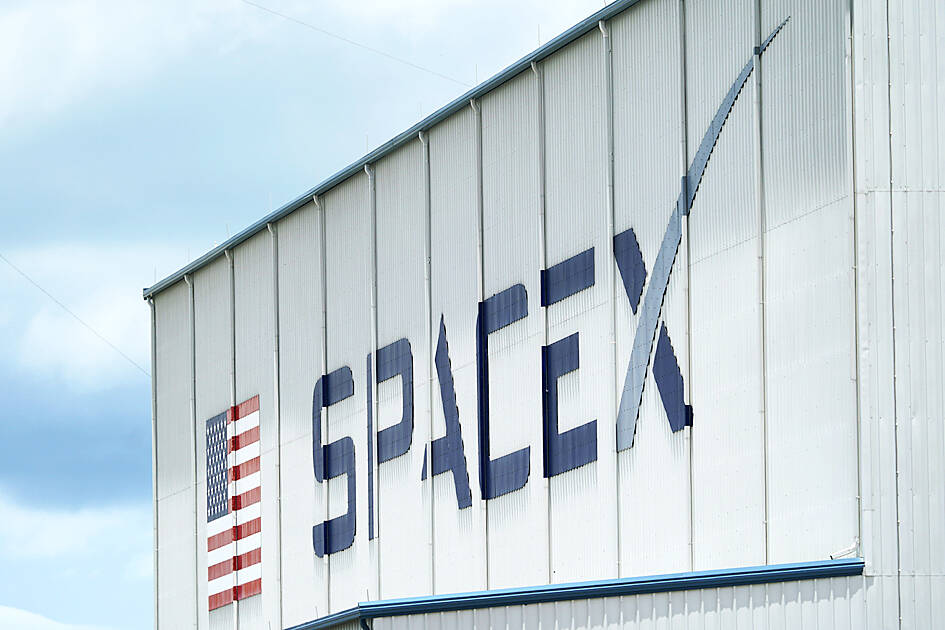Elon Musk’s Space Exploration Technologies Corp (SpaceX) is planning to invest US$1.5 billion in Vietnam, the country’s official news agency said, as the country looks to boost its attractiveness as an investment destination for the world’s biggest companies.
On a visit to New York this week, Vietnamese President To Lam met SpaceX senior vice president for global business and government affairs Tim Hughes, who said he “highly values” Vietnam’s potential for the company’s “satellite internet plan,” the Vietnam News Agency (VNA) said on Wednesday.
The government was “weighing the investment proposal,” VNA reported Lam as saying.

Photo:AP
Hughes reportedly said the firm aimed to inject US$1.5 billion into the country in the near future.
Hanoi has asked SpaceX to “closely coordinate with relevant Vietnamese agencies and partners to complete investment procedures,” VNA said.
SpaceX did not immediately respond to a request for comment.
Communist Vietnam — long a low-cost destination to make clothes, shoes and furniture — is eyeing a rapid climb up the global supply chain. Lam has had meetings with bosses from Google, Apple Inc, Meta Platforms Inc and Super Micro Computer Inc during his visit to New York.
US and Vietnamese businesses signed a number of deals during his trip, including in semiconductors, artificial intelligence (AI) and aviation.
VNA reported that Google’s Karan Bhatia, who leads government affairs and public policy, told Lam at their meeting that the tech firm wants more research and cooperation with Vietnam in developing AI and cybersecurity.
Lam said he welcomed Google’s proposal, emphasizing it would bring practical benefits to both sides, VNA said.

TAKING STOCK: A Taiwanese cookware firm in Vietnam urged customers to assess inventory or place orders early so shipments can reach the US while tariffs are paused Taiwanese businesses in Vietnam are exploring alternatives after the White House imposed a 46 percent import duty on Vietnamese goods, following US President Donald Trump’s announcement of “reciprocal” tariffs on the US’ trading partners. Lo Shih-liang (羅世良), chairman of Brico Industry Co (裕茂工業), a Taiwanese company that manufactures cast iron cookware and stove components in Vietnam, said that more than 40 percent of his business was tied to the US market, describing the constant US policy shifts as an emotional roller coaster. “I work during the day and stay up all night watching the news. I’ve been following US news until 3am

Six years ago, LVMH’s billionaire CEO Bernard Arnault and US President Donald Trump cut the blue ribbon on a factory in rural Texas that would make designer handbags for Louis Vuitton, one of the world’s best-known luxury brands. However, since the high-profile opening, the factory has faced a host of problems limiting production, 11 former Louis Vuitton employees said. The site has consistently ranked among the worst-performing for Louis Vuitton globally, “significantly” underperforming other facilities, said three former Louis Vuitton workers and a senior industry source, who cited internal rankings shared with staff. The plant’s problems — which have not

TARIFF CONCERNS: The chipmaker cited global uncertainty from US tariffs and a weakening economic outlook, but said its Singapore expansion remains on track Vanguard International Semiconductor Corp (世界先進), a foundry service provider specializing in producing power management and display driver chips, yesterday withdrew its full-year revenue projection of moderate growth for this year, as escalating US tariff tensions raised uncertainty and concern about a potential economic recession. The Hsinchu-based chipmaker in February said revenues this year would grow mildly from last year based on improving supply chain inventory levels and market demand. At the time, it also anticipated gradual quarter revenue growth. However, the US’ sweeping tariff policy has upended the industry’s supply chains and weakened economic prospects for the world economy, it said. “Now

COLLABORATION: Given Taiwan’s key position in global supply chains, the US firm is discussing strategies with local partners and clients to deal with global uncertainties Advanced Micro Devices Inc (AMD) yesterday said it is meeting with local ecosystem partners, including Taiwan Semiconductor Manufacturing Co (TSMC, 台積電), to discuss strategies, including long-term manufacturing, to navigate uncertainties such as US tariffs, as Taiwan occupies an important position in global supply chains. AMD chief executive officer Lisa Su (蘇姿丰) told reporters that Taiwan is an important part of the chip designer’s ecosystem and she is discussing with partners and customers in Taiwan to forge strong collaborations on different areas during this critical period. AMD has just become the first artificial-intelligence (AI) server chip customer of TSMC to utilize its advanced